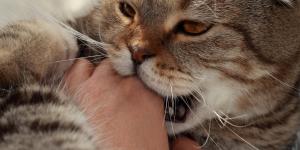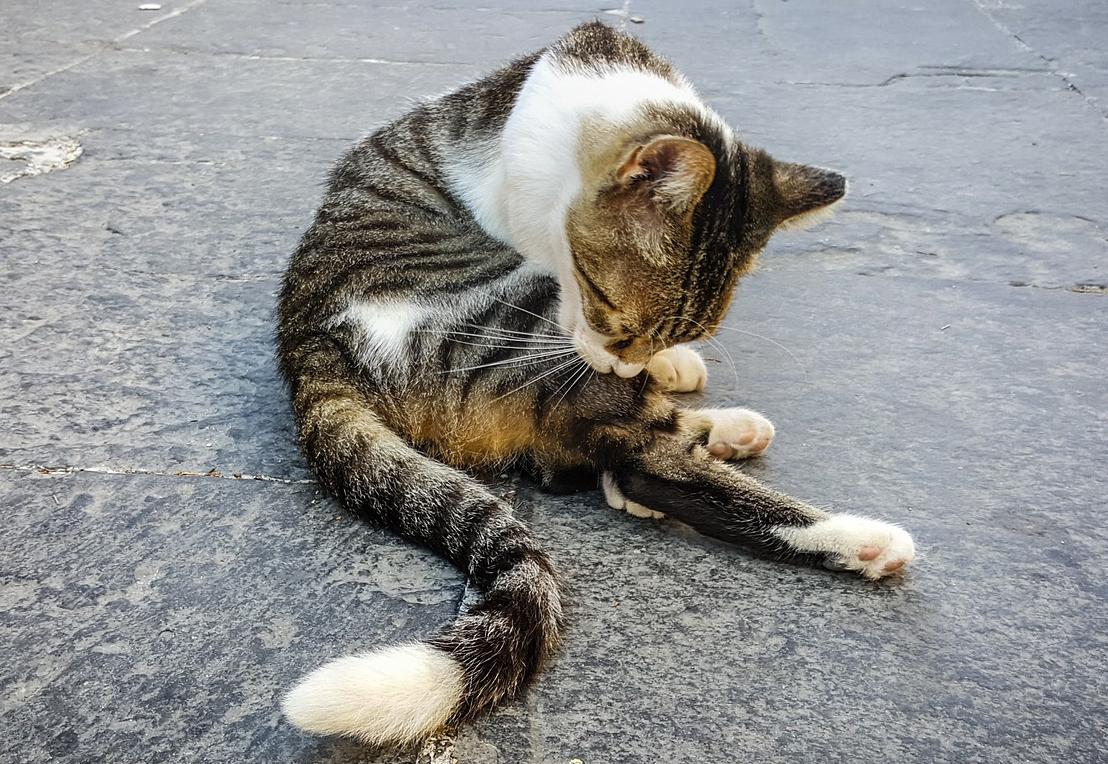My Cat Keeps Biting Itself - Causes of Excessive Fur Chewing



See files for Cats
Cats maintain a strict grooming routine. It is not abnormal for them to carefully lick every square inch of their body they can reach to eliminate dirt and remove dead hairs. However, it is important to stay alert to any changes which may occur in their grooming routine. Although they may groom a lot, overgrooming is a problem. If they start biting regularly and insistently, then this problem is getting worse.
AnimalWised notes how important it is to remember every cat is an individual. Their unique circumstances will dictate what is abnormal biting and what might be a cat simply trying to get at a particularly matted piece of fur. Any problems will depend on their routine, their environment, their education and their state of health. If your cat keeps biting itself, we look at the causes and solutions of excessive chewing to help you know what to do about it.
Why does my cat bite its tail?
If you are lucky enough to be the guardian of one or more cats, you may have noticed they often like to chase and bite their own tail. It won't happen with every cat, but this behavior is quite common in felines which retain a keen hunting instinct. When they play with their siblings, chase bugs across the carpet or even try to catch their own tail, it is an expression of this part of their nature.
While it is often fine for your cat to chase their own tail, it is possible they are doing it because they are bored. They may not have enough environmental enrichment to help keep them engaged, nor may they have enough time spent playing with their guardian. Proper exercise bolstered bye suitable games and toys will help engage their instincts and develop their cognitive abilities. If this happens, they may not resort to chasing their tail as much.
Problems might arise if you see your cat chasing their own tail with greater intensity and/or frequency. If it does this, it can result in self-mutilation. This is when the cat bites their tail so much, they cause wounds to appear on their skin. These wounds can become infected and lead to serious health problems. Additionally, it is vital to identify the cause of this excessive biting in order to control or prevent it, otherwise the cat's well-being may be significantly affected.
Only a properly trained veterinarian will be able to provide an adequate diagnosis. This will be given after a physical examination, assessment of their symptoms and the general state of their health. After this is reached, they will be able to prescribe the correct treatment. However, even though we can't diagnose the problem on our own, we can still have an idea of the reasons why your cat bites their tail. Here are some of the common causes of this behavior:
- Boredom or stress: if a cat lives with a sedentary routine and doesn't have an enriched environment, they are likely to show signs of stress and or boredom. You may see them begin to expend energy in unhealthy ways, biting their tail or overgrooming being one of them. There are other stressors for cats which can lead to such behavior, even if we may not be as sensitive to them. They include sudden changes in their environment, shifts in their routine, moving home, the presence of new individuals or stimuli in their environment and more.
- Parasites: cats are vaccinated and dewormed from their early stages of life because they are so susceptible to an infestation of parasites. There are various kinds of parasite, both internal and external, which manifest in various symptoms. Some are unique, others are shared by different types of parasite. If your cat licks or bites their tail incessantly, it could be due to many different species. However, fleas in particular cause cats to attack their tail, so give them a comb and check for the presence of these insects.
- Allergies: if your cat is allergic to certain substances, such as cleaning products or food, they may self-mutilate their tail as a way to try to manage their discomfort. It can be difficult to tell where the allergy comes from, so you may need to eliminate it by a process of elimination.
- Obsessive compulsive disorder: while cats do not get depressed in the same way as humans, this does not mean they cannot experience mental health problems. The reason for the mental health problem may be difficult to determine, but it is possible for cats to experience the symptoms of OCD which are “characterized by repetitive, ritualistic behaviors, in excess of any required for normal function, the execution of which interferes with normal, daily activities and function”[1]. These behaviors are known as stereotypies and may need to be controlled by the use of antidepressants.
- Psychogenic alopecia: alopecia is the general term for hair loss which can be caused by various issues, both physiological and psychological. The latter is diagnosed when the former is ruled out. This can be seen in a self-mutilation case study from 2016 whereby a cat was biting their tail and where “[n]eurological and dermatological examinations, radiographs, urine and blood tests did not show any abnormalities”[2]. Psychogenic alopecia was diagnosed after everything else was ruled out. After treatment with antidepressants, the cat stopped self-mutilating.
- Feline hyperesthesia syndrome: also known as rolling skin disease, this is a very rare condition with no known specific cause. It isn't like stereotypies caused by OCD as it appears to occur in episodes where self-mutilation is part of the clinical picture. Due to its episodic nature, it is thought to be similar to a condition like epilepsy. The first retrospective study was carried out in 2019, but the cause is still yet to be determined. It does not appear to be a problem with the nervous system[3].
It is important to remember what might be a symptom of a psychological or physiological problem and what is normal behavior. A cat's innate hunting instinct might cause they to chase their tail or they may simply be performing a healthy amount of grooming. It is when the behavior becomes obsessive and they start to lose fur and damage their skin that a problem is present.

Why is my cat biting its legs?
In general, the reasons why a cat might bite their legs are similar to the reason why they bite their tail. They won't chase their legs like a cat chases their tail, but stress and boredom can still lead to overgrooming. Parasites can also cause them to want to bite and scratch their legs, but their may be some which might make them bite their legs in particular. For example, ticks hide in grasses and other plants, so may brush up against their legs when walking past.
Cats may also bite their legs because they want attention from their guardian. Cats are more social than people often give them credit for. If they do not receive sufficient attention from their human family, they may self-mutilate as a means of getting attention. This is something they may also do to their tail.
If your cat is biting or chewing their legs or paws, we should consider the specifics of these areas. As their paws are closest to the ground, we should consider if there is something on their paws which might be leading to the intense biting. Perhaps they have stood on something sharp or some foreign body has become stuck. Cat's paws are very sensitive, so it might not take much to cause them pain. Give them a careful examination yourself, but take them to the vet if you can't see anything wrong and they persist in overgrooming.
Why does my cat bite their tongue?
This is a relatively uncommon behavior in cats. If a guardian sees it occur in their cat, then it is understandable they become worried. In general, a cat will bite their tongue when they feel discomfort in the mouth. Itching or pain may also occur. Almost all of these oral complaints with teeth and gums derive from inflammatory and progressive conditions such as gingivitis or periodontitis in cats.
Unfortunately, oral diseases in cats are much more frequent than we would like them to be. The vast majority of dental problems derive from the formation of tartar between the teeth and gums of cats. They can be best avoided by adopting a proper dental hygiene routine which includes regular brushing.
How to prevent your cat biting themselves
As you can see, there are many reasons why a cat might bite themselves. It is essential you find the particular cause and provide the appropriate treatment, something which can only be done by a qualified veterinary medical health professional. As with any health problem in cats, prevention is better than cure. Here are some general guidelines to help you prevent your cat from biting their tail, legs, tongue or any part of their body:
- Preventive medicine: whether you adopt an adult cat or a newborn kitten, you will need to offer effective preventive medicine throughout their lives. Their vaccination schedule will need to be met and they will need to be dewormed regularly. Basics like appropriate feline nutrition and visits to the veterinarian every 6 to 12 months are also important prevention methods.
- Maintain optimal oral hygiene: regular teeth brushing will help your cat prevent the accumulation of food debris between their teeth and gums which leads to the formation of tartar.
- Environmental enrichment: having at your cat's disposal intelligence games, toys and accessories will enrich your cat's environment and exercise their body and mind. They will expend energy, have fun and combat to possibility of boredom and stress.
- Positive environment: ensuring your cat feels safe, secure and free to express themselves physically and emotionally is imperative. It is also important to establish a play routine on a daily basis and not to disrupt their general routine too dramatically. Cats need a regular routine and can suffer if they feel threatened.
- Regular checks: even if your cat is not longhair, you should brush your cat regularly. Doing so not only helps keep their coat in condition, but allows you to check for wounds, parasites or any abnormalities. You should also check their mouths (especially their gums) for any signs of inflammation or disease. Do this from an early age so that the cat can become used to it and there will be less chance of rejection.

If you want to read similar articles to My Cat Keeps Biting Itself - Causes of Excessive Fur Chewing, we recommend you visit our Behavioral problems category.







